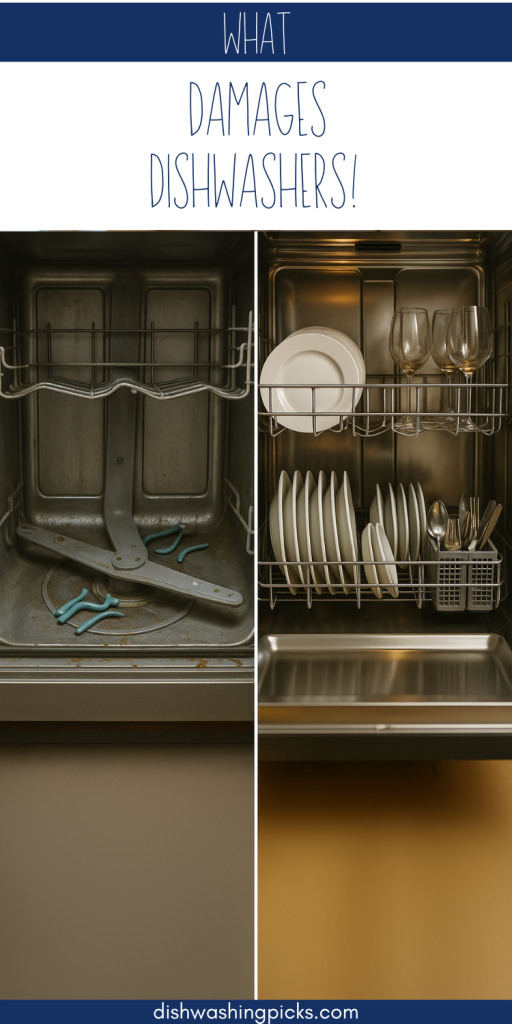
Wait—Can You Actually Ruin a Dishwasher?
Oh yes. As much as we’d like to believe dishwashers are indestructible kitchen robots that can handle anything you throw at them (literally and figuratively), they’re actually a bit… sensitive.
Kind of like that one friend who seems super chill until you forget their birthday.
They’ll still work—but something’s going to break eventually.
So let’s talk about the sneaky stuff that shortens your dishwasher’s life—without you even realizing it.
1. Overloading It Like You’re Playing Tetris on Expert Mode
We’ve all been there: “Just one more plate,” you think, as you wedge a bowl at a 45-degree angle between two mugs and hope the door closes.
Yeah… your dishwasher hates that.
Why? Because cramming in too many dishes:
- Blocks the spray arms from spinning freely
- Prevents water from reaching everything evenly
- Makes the motor work harder
- And often leaves food gunk stuck to half your stuff anyway
Try thinking of it this way: Your dishwasher isn’t a clown car. Give your dishes a little breathing room—they’ll get cleaner, and your appliance will last longer.
2. Not Cleaning the Filter (Like, Ever)
Here’s a fun experiment: open the bottom of your dishwasher and take a look at the filter.
If it looks like a science project… we need to talk.
That filter catches all the food scraps and debris from each wash. If you ignore it for too long, it clogs up, smells weird, and forces the pump to work overtime.
A dirty filter = poor cleaning, possible flooding, and long-term damage to internal parts.
Just rinse it under warm water once every week or two. It takes 30 seconds and saves you from future headaches (and odors you can’t un-smell).
3. Using Regular Dish Soap (Please Don’t)
If you’ve ever run out of dishwasher detergent and thought,
“Eh, I’ll just use a little squirt of regular dish soap…”
Let us gently scream: DON’T DO IT.
Regular dish soap—like the stuff you use in the sink—creates way too many suds for a dishwasher. You’ll end up with:
- Foam overflowing from the door
- A bubbly mess all over your floor
- A deeply confused appliance
- And possibly some damage to the motor or sensors
Pro tip: Stick to actual dishwasher detergent—whether it’s pods, powder, or gel. And yes, those tablets that say “3-in-1”? They’re fine (as long as you use the right amount).
4. Hard Water Buildup
This one’s sneaky. You don’t see it coming… but it’s slowly happening every time you run the machine.
If you live in an area with hard water (i.e. water that has a lot of minerals like calcium and magnesium), it can:
- Leave white spots or cloudy film on glassware
- Build up inside spray arms and pipes
- Reduce efficiency
- Eventually shorten your dishwasher’s lifespan
Solution: Use a rinse aid, clean your dishwasher monthly with vinegar or a dishwasher cleaner, and if it’s really bad—look into a water softener. Your dishes (and your dishwasher) will thank you.
5. Running It With Food Still Caked On
Let’s set the record straight:
You don’t need to pre-wash everything until it looks clean enough to eat off of.
But you do need to scrape.
Leaving chunks of food—like rice, pasta, meat, or veggies—can:
- Clog the filter
- Jam the drain pump
- Rot and start smelling like a dumpster by Day 3
- And recirculate food bits all over your clean dishes (ew)
Imagine this: Would you clean your face with a towel that just wiped up spaghetti sauce? Same concept.
A quick scrape into the trash or compost bin is all it takes.
6. Putting in Things That Don’t Belong (At All)
Believe it or not, your dishwasher has boundaries.
Certain items don’t belong in there—not just because they won’t clean properly, but because they can actually harm the machine itself.
Things to keep out:
- Wooden utensils or cutting boards – they warp and crack
- Cast iron – it rusts and loses its seasoning
- Nonstick pans – dishwasher heat can degrade the coating
- Sharp knives – dull faster and can nick the racks
- Crystal or vintage china – too fragile
- Plastic containers not labeled “dishwasher safe” – hello, melty mess
If it’s fragile, valuable, or you love it—wash it by hand. It’s not worth the risk.
7. Skipping Regular Maintenance
We clean our phones. We clean our cars. But how often do we clean… our dishwasher?
Letting grime build up in the spray arms, filter, or door seals can lead to:
- Mold
- Mildew
- Bad smells
- Inefficient performance
- And yes—early appliance death
Easy routine: Once a month, run a hot cycle with a cup of white vinegar on the top rack. Then wipe down the interior and door seals. Done.
Wrapping It Up: Treat It Right, and It’ll Treat You Right
So, what damages dishwashers?
- Overstuffing
- Wrong detergent
- Neglecting the filter
- Hard water buildup
- Caked-on food
- Incompatible items
- Skipping maintenance
That might sound like a lot, but the fixes? Super simple.
Challenge for this week: Give your dishwasher a little TLC—scrape, load mindfully, run a cleaning cycle, and ditch the Dawn (you know who you are 😄).
A well-maintained dishwasher not only works better—it lasts longer, smells cleaner, and saves you from expensive repair calls (or the horror of going back to hand-washing full time).
